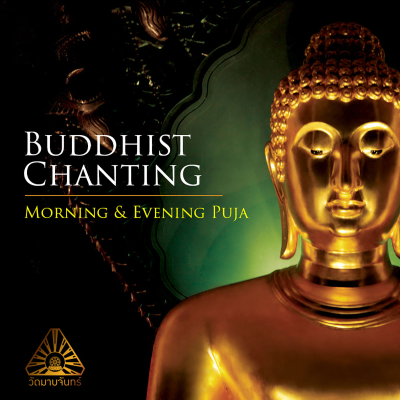
Buddhist Chanting
Podcast de Ajahn Anan Akiñcano
Set in traditional Pāli, the language of the Buddha, these morning and evening puja chants have been used for centuries to deepen faith, brighten the heart and prepare the mind for meditation. For more information, visit www.watmarpjan.org/en.
Empieza 7 días de prueba
$99.00 / mes después de la prueba.Cancela cuando quieras.
Todos los episodios
37 episodios“Through chanting the recollection of the Buddha 108 times a day with firm intention, the mind is firmly established on the path to heaven and Nibbāna.” Itipi so bhagavā (He, the Blessed One) Arahaṃ (Is indeed the Pure One) Sammāsambuddho, (The Perfectly Enlightened One) Vijjācaraṇa-sampanno (He is impeccable in conduct and understanding) Sugato (The Accomplished One) Lokavidū, (The Knower of the Worlds) Anuttaro purisadamma-sārathi (He trains perfectly those who wish to be trained) Satthā deva-manussānaṃ (He is Teacher of gods and humans) Buddho (He is Awake) Bhagavā’ti. (And Holy) This chant praises the qualities of the Buddha. Chanted in Pali 108 times by Venerable Ajahn Anan Akincano. This chant is a support for one's practice of Buddhanusati, the recollection of the Buddha. Ajahn Anan praises the recitation of this chant as part of one's practice in many of his Dhamma talks. Ajahn Anan suggests that we chant it every day, even many hundreds of times in a day, and throughout our daily activities as a way to support mindfulness and brighten the mind as foundations for peace, collectedness, and insight into the Dhamma. One can follow along on pages 202-3 of the Wat Marp Jan chanting book and see the translation in English as well: https://watmarpjan.org/en/wp-content/uploads/sites/2/Wat-Marp-Jan-English-Chanting-Book-2562-Edition.pdf
English devotional chanting for the occasion of Magha Puja.
This chant, in English, is for the day of Asalha Puja, July 5, the full moon day (2020). Asalha Puja commemorates the first teaching of the Buddha, The Discourse of Setting the Wheel of Dhamma in Motion, the Dhamma-cakkappavattana Sutta. One can watch the replay of the entire Wat Marp Jan Asalha Puja ceremony here: https://www.youtube.com/watch?v=hiRJ-q_VpVk This Sutta is found on pages 96-108 of the Wat Marp Jan chanting book, found here: https://watmarpjan.org/en/wp-content/uploads/sites/2/Wat-Marp-Jan-English-Chanting-Book-2562-Edition.pdf. On this day the Buddha taught the group of five ascetics, and Anya Kondanya became the first disciple to see the Dhamma.
The ten parami, or perfections, are qualities that a Bodhisattva cultivates to a supreme level in order to become a Buddha, an awakened one. All spiritual practitioners cultivate these qualities to some degree. The chant translates as: "The perfection of giving/generosity (Dāna pāramī), the perfection of giving to the utmost, the perfection of giving to the supremely utmost, lovingkindness, compassion, sympathetic joy, equanimity perfection. Thus, indeed, is the Fortunate and Blessed One..." Then as above for the remaining pāramīs: Sīla pāramī : virtue, morality Nekkhamma pāramī : renunciation Paññā pāramī : wisdom Viriya pāramī : energy, vigour Khanti pāramī : patient endurance, forbearance Sacca pāramī : truthfulness Adhiṭṭhāna pāramī : determination Mettā pāramī : loving-kindness Upekkhā pāramī : equanimity Finishing with Dasa (ten) pāramī: recollecting all of the Buddha's perfections.
This chanting, led by Ajahn Anan, is done regularly at Wat Marp Jan. Chanting is a skillful way to quiet the mind and reflect on liberating teachings. This chant is traditionally used for blessings and protection, especially on holidays or other auspicious occasions, though it can be recited at any time. One can listen peacefully or chant along in the Wat Marp Jan chanting book (pages 163-211): https://watmarpjan.org/en/audio-books/books/ (English translation included).
Empieza 7 días de prueba
$99.00 / mes después de la prueba.Cancela cuando quieras.
Podcasts exclusivos
Sin anuncios
Podcast gratuitos
Audiolibros
20 horas / mes























